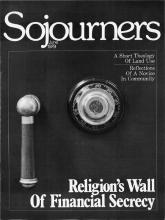In a March 1978 meeting of my religious community, Jubilee Fellowship, several members urged us to be more deeply involved in the needs of our immediate neighborhood in the Southwest Germantown section of Philadelphia. "Some of us don't even know our next door neighbors, much less whether there's a lonely elderly person down the block," was the complaint. "How can we talk about peace and social justice in the world if we aren't doing something about conflict, poverty, and injustice right around the corner?"
We were not totally uninvolved in our neighborhood. We had done some significant work in housing rehabilitation, joined local improvement groups, worked in the public school, and helped Chilean refugees find homes and jobs nearby. But living in a racially-mixed, low-to-moderate income area of Philadelphia, we had the uneasy feeling that God was calling us to do more.
After much deliberation, we decided to pay one of our members part-time to do some basic research on our neighborhood. As the person selected to do this work, I'd like to share with you my research process and some of its results. Although mine is not the only approach that can be undertaken, perhaps my work will give you ideas that your fellowship or neighborhood group can use to bring about deeper involvement with your own neighbors and their needs.
What is God's will for your neighborhood?
I believe that we can discern certain ways in which God's will is at work in every neighborhood. This discernment must shape our research in a decisive way.
Read the Full Article

